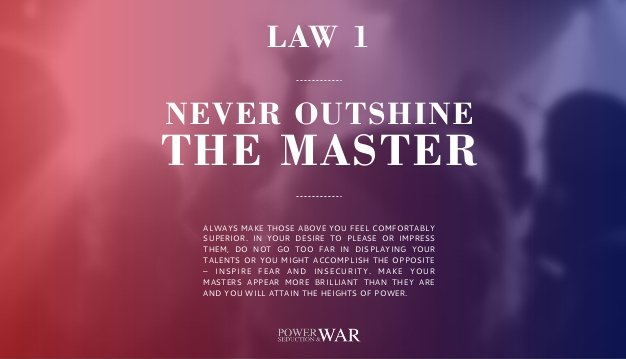
Being a leader is so demanding and not many have lived to the expectations of their desperate servants who always need them when they are down.
Although leaders are born, it is better to not that after they are born, they are then made to be leaders by their respective servants.
The following are some of the rules of power that every leader must know if she or he wants to be successful in life.
This laws were formulated by Robert Greene who observed that elite leaders all shared certain successful traits with all-time old leaders.
- Never outshine the master. Always make those in positions of authority over you feel comfortable about their place of superiority. Even though you may want to impress them and prove your value to them, if you overdo it with displays of your talent you run the risk of causing them to feel threatened and insecure. Try to make your superiors appear more brilliant than they are in order to maximize your power standing.
- Never put too much trust in friends, learn how to use enemies. Friends can easily be prone to envy, so be wary of them and their capacity for betrayal. “But hire a former enemy and he will be more loyal than a friend, because he has more to prove,” according to The 48 Laws of Power. “In fact, you have more to fear from friends than from enemies. If you have no enemies, find a way to make them.”
- Conceal your intentions. Never reveal the explicit purpose behind your actions. This will throw potential adversaries off and put them in a state of guessing. The result is if they have no idea what you’re going to do and can’t establish a defense. “Guide them far enough down the wrong path, envelope them in enough smoke, and by the time they realize your intentions, it will be too late” (The 48 Laws of Power).
- Always say less than necessary. Don’t be too verbose even if you aim to impress with words. “The more you say, the more common you appear, and the less in control” (The 48 Laws of Power). Even what you’re saying is trite and commonplace, it will appear original if you phrase your thoughts in indistinct, open-ended terminology. “Powerful people impress and intimidate by saying less. The more you say, the more likely you are to say something foolish” (The 48 Laws of Power).
- So much depends on reputation—guard it with your life. “Reputation is the cornerstone of power” (The 48 Laws of Power). If your reputation precedes you, people will feel intimidated, thus enabling you a greater chance of victory win. Vulnerability results from a tarnished reputation and creates susceptibility to attack. Be vigilant of possible attacks and counter them before they occur. Simultaneously, spotlight the flaws in your enemies reputations. This will enable public opinion to do them in.
- Court attention at all costs. Everything is judged by its appearance; what is unseen counts for nothing. Don’t allow yourself to get lost in the fray or covered in the oblivion of a crowd. Be conspicuous to no end and at all cost. “Make yourself a magnet of attention by appearing larger, more colorful, more mysterious, than the bland and timid masses” (The 48 Laws of Power).
- Get others to do the work for you, but always take the credit. Use others’ intelligence and labor to promote further your agenda. “Not only will such assistance save you valuable time and energy, it will give you a godlike aura of efficiency and speed” (The 48 Laws of Power). Assistants will always be forgotten, while the powerful who are in touch with this seventh law will stand the test of time and establish a legacy of accomplishment.
- Make other people come to you—use bait if necessary. When you compel another individual to take action, it gives you the element of control. In this regard your enemy visits your home turf and must play by your rules, thus forgoing his or her own plans. Bait should take the form of promises of advantageous gains. This makes your adversary vulnerable to attack.
- Win through your actions, never through argument. Talk is cheap, especially if it’s tinged with anger. “The resentment and ill will you stir up is stronger and lasts longer than any momentary change of opinion” (The 48 Laws of Power). Actions always communicate and accomplish much more toward winning favor and agreement from people. “Demonstrate, do not explicate” (The 48 Laws of Power).
- Infection: avoid the unhappy and unlucky. Though your compassionate, charitable side may compel you to associate with the sad and downtrodden, if power attainment is your goal then avoid such people. Their bad vibe and energy-draining demeanor are too often infectious. You run a very serious risk of falling into line with their misery. Instead spend your time with people who are happy and successful. You can die from someone else’s misery – emotional states are as infectious as disease.
- Learn to keep people dependent on you. A key to a position of power and independence is being needed and desired. “Make people depend on you for their happiness and prosperity…[and] never teach them enough so that they can do without you” (The 48 Laws of Power).
- Use selective honesty and generosity to disarm your victim. Weakening your opponent’s guard is central to Law 12. The power of a single generous or sincere gesture masks many dishonest ones. Even the most dubious will bend in the face of honesty and generosity. “Once your selective honesty opens a hole in their armor, you can deceive and manipulate them at will. A timely gift—a Trojan horse—will serve the same purpose” (The 48 Laws of Power).
- When asking for help, appeal to people’s self-interests, never to their mercy or gratitude. A payoff—a return on investment, so to speak—goes much further toward commissioning someone’s assistance than does an appeal to their sense of gratitude or compassion. Don’t make people feel like they owe you or worse, that you’re in a bad spot and need help. “Instead, uncover something in your request, or in your alliance with him, that will benefit him, and emphasize it out of all proportion. He will respond enthusiastically when he sees something to be gained for himself” (The 48 Laws of Power).
- Pose as a friend, work as a spy. Accurate, detailed knowledge about a rival is essential. Use other people as spies to collect this valuable intelligence that will keep you ahead of the game. It’s even better if you can play the role of spy yourself. “In polite social encounters, learn to probe. Ask indirect questions to get people to reveal their weaknesses and intentions. There is no occasion that is not an opportunity for artful spying.” (The 48 Laws of Power).
- Crush your enemy totally. Total victory depends on complete destruction of your opponent. Show no mercy, most especially if the opposition is formidable. Don’t allow the possibility for recovery. This will inevitably result in your replenished enemy’s quest for revenge. “More is lost through stopping halfway than through total annihilation: The enemy will recover, and will seek revenge. Crush him, not only in body but in spirit” (The 48 Laws of Power).
- Use absence to increase respect and honor. Keep yourself in demand by not being too available or accessible. A temporary absence from a group of which you’re a part will cause you to be the center of discussion and increase your colleagues’ admiration for you. Scarcity is the key to value.
- Keep others in suspended terror: cultivate an air of unpredictability. Since humans are creatures of habit and are very much driven by the need to see familiarity in others’ actions, predictability relinquishes control. Be purposely unpredictable because behavior that seems to have no set patterns or obvious intentions will keep people off-kilter. They will spend lots of energy attempting to figure out what your next move will be. In extreme cases, this can inspire downright terror.
- Do not build fortresses to protect yourself. Isolation is dangerous. Even though this dangerous world may make a cloistered fortress seem like the safest place to be at times, isolation in fact opens you up to more dangers than from which it may protect you. “It cuts you off from valuable information, it makes you conspicuous and an easy target. Better to circulate among people find allies, mingle. You are shielded from your enemies by the crowd” (The 48 Laws of Power).
- Know who you’re dealing with; do not offend the wrong person. Take a very subjective approach when considering how to deal with a specific adversary. If you mislead or put in check certain people, they won’t rest until revenge is theirs. Carefully select who to take advantage of or do battle with, and never fool or upset the wrong person.
- Do not commit to anyone. Avoid taking sides and never commit any cause except your own. “By maintaining your independence, you become the master of others— playing people against one another, making them pursue you” (The 48 Laws of Power).
- Play a sucker to catch a sucker—play dumber than your mark. No one likes feeling dumber than others. Make your victims and adversaries feel intelligent, and most importantly, smarter than you. This prevents them from considering or suspecting that you have a hidden agenda.
- Use the surrender tactic: transform weakness into power. If it’s clear that your opponent is stronger, never fight for the sake of honor. Instead, opt for surrender because it provides time to recuperate, harass your enemy, and it affords time to allow for his or her power to decrease. “Do not give him the satisfaction of fighting and defeating you—surrender first. By turning the other check you infuriate and unsettle him. Make surrender a tool of power” (The 48 Laws of Power).
- Concentrate your forces. Store up your resources and energy by keeping them focused at their strongest, most productive area. “You gain more by finding a rich mine and mining it deeper, than by flitting from one shallow mine to another—intensity defeats extensity every time” (The 48 Laws of Power). When searching for sources of power to lift you up, find the one lucrative benefactor, “the fat cow who will give you milk for a long time to come” (The 48 Laws of Power).
- Play the perfect courtier. The perfect courtier’s world is based upon power and political deftness. “He has mastered the art of indirection; he flatters, yields to superiors, and asserts power over others in the most oblique and graceful manner,” (The 48 Laws of Power).
- Re-create yourself. Do not acquiesce to the roles that society forces you to play. Always be willing to re-create yourself by establishing a fresh identity, one that attracts and commands attention and is never boring. In this respect you become the the master of your own image instead of allowing other people or your social origin define if for you. Apply dramatic, theatrical elements into what you do publicly. This will boost your power and make your persona appear larger than life.
- Keep your hands clean. Create the image of one who is forever set on the moral high road. “You must seem a paragon of civility and efficiency: Your hands are never soiled by mistakes and nasty deeds” (The 48 Laws of Power). Make this happen by casting others as scapegoats and proxy agents to do the dirty work and thus conceal your involvement.
- Play on people’s need to believe to create a cultlike following. People have an overwhelming desire to believe in something.Captialize on people’s strong inclination to embrace a belief. Step in as the main attraction on this front by offering them some kind of cause or new faith to follow. “Keep your words vague but full of promise; emphasize enthusiasm over rationality and clear thinking” (The 48 Laws of Power). Provide your followers with rituals they must perform and request that they make sacrifices on your behalf. “In the absence of organized religion and grand causes, your new belief system will bring you untold power” (The 48 Laws of Power).
- Enter action with boldness. Avoid timidity, which is dangerous. If you aren’t sure of a course of action to take, then don’t try it. Doubt and hesitancy will hamper your ability to operate. It’s always better to begin a course of action boldly. “Any mistakes you commit through audacity are easily corrected with more audacity. Everyone admires the bold; no one honors the timid” (The 48 Laws of Power).
- Plan all the way to the end. Never neglect to envision the end result of any endeavor. Plan all the way to to the very end and account for “all the possible consequences, obstacles, and twists of fortune that might reverse your hard work and give the glory to others” (The 48 Laws of Power). Planning to the end of a campaign mitigates the possibility that you will be overwhelmed by fate’s circumstances, and it also allows you a reliable gauge on when to wisely cease your quest. “Gently guide fortune and help determine the future by thinking far ahead” (The 48 Laws of Power).
- Make your accomplishments seem effortless. Your actions must seem natural and executed with ease. All the toil and practice that go into them, and also all the clever tricks, must be concealed. When you act, act effortlessly, as if you could do much more. Avoid the temptation of revealing how hard you work – it only raises questions. Teach no one your tricks or they will be used against you.
- Control the options: get others to play with the cards you deal. Create the illusion of choice. This makes your adversaries feel in control of a situation, although they are unwittingly doing your bidding because you control the scenario’s context. Stack the deck, so to speak: make sure the options you provide lead to outcomes favorable to you regardless of the choices others make.
- Play to people’s fantasies. People tend to avoid truth because it is very often unattractive and harsh. “Never appeal to truth and reality unless you are prepared for the anger that comes for disenchantment” (The 48 Laws of Power). Life is very cruel and upsetting, so people who can create escapist notions based on an appeal to the allure of fantasy “are like oases in the desert: Everyone flocks to them. There is great power in tapping into the fantasies of the masses (The 48 Laws of Power).
- Discover each man’s thumbscrew. Everyone has a key weakness, which usually takes the form of “an insecurity, an uncontrollable emotion or need; it can also be a small secret pleasure” (The 48 Laws of Power). When you discover your enemy’s “thumbscrew,” you can exploit it to your advantage.
- Be royal in your fashion: act like a king to be treated like one. Carry yourself with an air of regality. The image and aura you project often dictates how others respond to and treat you. Don’t appear appearing crude or or ordinary, as it will lead to disrespect. “By acting regally and confident of your powers, you make yourself seem destined to wear a crown” (The 48 Laws of Power).
- Master the art of timing. Appear patient, never in a hurry. Being in a rush shows a lack of self-control as well as a lack of control over time. Act as if you know that things will come to you eventually. “Become a detective of the right moment; sniff out the spirit of the times, the trends that will carry you to power. Learn to stand back when the time is not yet ripe, and to strike fiercely when it has reached fruition” (The 48 Laws of Power).
- Disdain things you cannot have: ignoring them is the best revenge. By spending time and attention devoted to a small problem, you magnify its importance and lend it undeserved credibility. “The more attention you pay an enemy, the stronger you make him; and a small mistake is often made worse and more visible when you try to fix it” (The 48 Laws of Power). Sometimes it’s most advantageous to best to ignore things. “If there is something you want but cannot have, show contempt for it. The less interest you reveal, the more superior you seem” (The 48 Laws of Power).
- Create compelling spectacles. Because striking visuals and grandiose symbolic acts create the ambience of power, the vast majority of people respond to them. “Stage spectacles for those around you, then, full of arresting visuals and radiant symbols that heighten your presence” (The 48 Laws of Power). Awestruck by surface appearances, your true intentions and aspirations will be concealed while everyone is focused on the distraction that your spectacle strategy creates.
- Think as you like but behave like others. Be guarded with your uniqueness and flair for originality. Save it for only those tolerant friends and people you know will appreciate your flair for the unconventional. With the masses, overt displays of unorthodoxy or rebelliousness garners rejection because people will assume you’re an attention hound and that you feel superior to them. “It is far safer to blend in and nurture the common touch” (The 48 Laws of Power).
- Stir up waters to catch fish. While it’s important to keep your own anger and emotion in check, stirring your opponents into a tizzy can lead you to a considerable advantage. Because anger and a lack of emotional control don’t jibe with productive strategy, always be calm and objective. “Put your enemies off-balance: Find the chink in their vanity through which you can rattle them and you hold the strings” (The 48 Laws of Power).
- Despise the free lunch. Watch out for freebies because free goods or services are either apply or carry a hidden price. “By paying your own way you stay clear of gratitude, guilt, and deceit” (The 48 Laws of Power). It is also often wise to pay the full price – there is no cutting corners with excellence. Also, don’t appear to be miserly. Instead be liberal with your spending—generosity is an indicator and a lure for power.
- Avoid stepping into a great man’s shoes. Pioneers are always thought to be superior to and more original than their successors. If you succeed a great man or have a famous parent, you will have to accomplish double their achievements to outshine them. Do not get lost in the shadow of a storied forbear or bogged down in someone else’s history that wasn’t of your own making. “Establish your own name and identity by changing course. Slay the overbearing father, disparage his legacy, and gain power by shining in your own way” (The 48 Laws of Power).
- Strike the shepherd and the sheep will scatter. Problems often have a root in one particular individual. This person is a spark that ignites ill-will toward you in others that obviously can result in dire, power-squelching results. Don’t give such people an inch to operate and forget about attempting to negotiate. “Neutralize their influence by isolating or banishing them. Strike at the source of the trouble and the sheep will scatter” (The 48 Laws of Power).
- Work on the hearts and minds of others. Coercion must at some point give way to seduction. Forcing people into submission is a short-term solution to power creation. The long term requires that you convince them to want to go along with your program. “A person you have seduced becomes your loyal pawn. And the way to seduce others is to operate on their individual psychologies and weaknesses. Soften up the resistant by working on their emotions, playing on what they hold dear and what they fear” (The 48 Laws of Power).
- Disarm and infuriate with the Mirror Effect. This powerful strategy is quite an instrument for deception. When you mirror what your enemies do, there’s no way for them to deduce what your actual game plan is. The Mirror Effect mocks and humiliates them, making them overreact. By holding up a mirror to their psyches, you seduce them with the illusion that you share their values; by holding up a mirror to their actions, you teach them a lesson” (The 48 Laws of Power).
- Preach the need for change, but never reform too much at once. Though the need for change is easily accepted in the abstract, on a tangible, everyday level it’s actually traumatic to people if too much change and innovation happens too quickly. If you try to do too much too soon, the tide of opinion will turn to a state of revolt and rejection. Too much innovation is traumatic, and will lead to revolt. New power-holders or those attempting to amass a power base should be overt about demonstrating respect for the established way of doing things. If change is essential, make people feel like it’s a benign improvement on what’s come before.
- Never appear perfect. Anybody who projects an air of flawlessness is bound to incur feelings of envy. This goes beyond seeming superior to others and is a very dangerous path because envy creates silent opponents. It is wise to every now and then reveal flaws and mild shortcomings. This dispels envy and makes you seem more accessible and less lofty.
- Do not go past the mark you aimed for; in victory, learn when to stop. This law is primarily about preventing the ego from derailing gains accomplished after victory is yours. “In the heat of victory, arrogance and overconfidence can push you past the goal you had aimed for, and by going too far, you make more enemies than you defeat” (The 48 Laws of Power). Never permit success to go to inflate your ego too far out of proportion. Knowing when to stop comes into play in this dynamic. Stick to your commitment to strategy and precise planning. “Set a goal, and when you reach it, stop” (The 48 Laws of Power).
- Assume formlessness. Careful planning doesn’t mean rigid inflexibility. Avoid being predictably tied to a particular pattern of behavior and action. “By taking a shape, by having a visible plan, you open yourself to attack. Instead of taking a form for your enemy to grasp, keep yourself adaptable and on the move” (The 48 Laws of Power). Nothing is completely certain and no law is every set in stone. “The best way to protect yourself is to be as fluid and formless as water; never bet on stability or lasting order. Everything changes” (The 48 Laws of Power).














